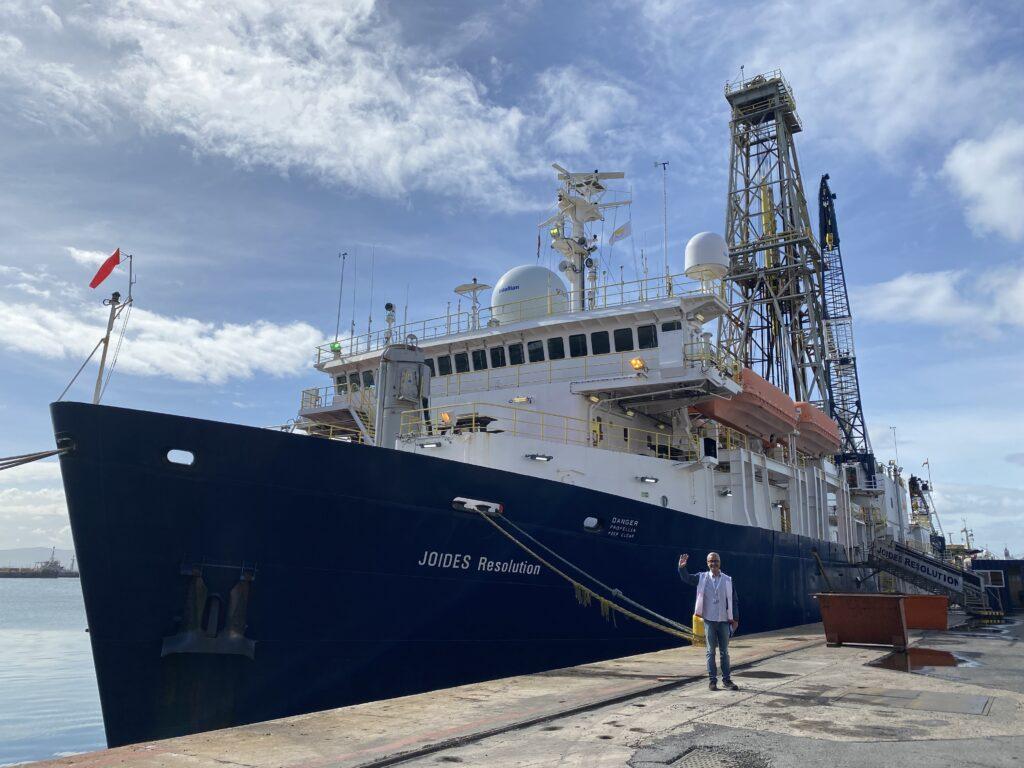
Of Patterns and Randomness
This post was written by EXP397T geochemist Dr. Rajneesh Bhutani.
I missed expedition 391 for the late arrival of my South African Visa. It was completely unexpected as rarely did the South African visa get delayed. But unexpected things keep happening. Who would have expected that a spread of the new variant Omicron would coincide with the start of the expedition? Missing the expedition, though, was not new to me. It followed a pattern in my life. It was the fourth time that I had missed different kinds of ocean science expeditions because of strange reasons. It appeared that destiny didn’t want me going to sea. However, I broke the jinx by successfully participating in an Indian expedition to the Bay of Bengal last year in September. I was therefore hopeful of making it to expedition 391 too. But it was not to be, and the pattern continued.
Randomness asserts itself when one accepts a pattern, and 397T happened- a rare instance of resuming from an earlier IODP expedition. This time I had to get two visas, and both came in quickly, and I am here. So, finally, has the pattern of failing to participate in an ocean expedition broken? After I cleared the Covid test in Cape Town and boarded the magnificent JR, l thought I won the battle against destiny.
But one thing the covid keeps reminding us is that life is full of uncertainties. The very first morning of my shift, I was in the chemistry lab sharp at 6 AM, excitedly exploring all the work that we could do with the potentially interesting cores that we were going to get. I was anxious to learn everything required for core description and other crucial data generation. My experienced colleagues patiently explained everything to me. It all was too exciting. My mind was occupied with the kind of science questions that one can address. However, the state of mind quickly changed with the news that one science party member tested positive and had to stay isolated for a few days. While we were trying to come to terms with this news, the very next day, a couple more of us turned out to be positive. Now that we are just a day away from our first site, our thoughts are with those in isolation.
Today morning at 6 AM, long before the sunrise, when I stood at the deck staring at the vast expanse of dark water – a vast expanse of nothingness – a vast expanse of churning – I was reminded of a couplet from Mirza Ghalib, a renowned Urdu poet of 19th century – “World’s eye is closed to the lesson it would have learnt. Earth and sky are like a leaf of a book that has been turned.”
The one lesson we need to keep reminding ourselves of is about the uncertainties in life. Things often happen randomly, though a pattern emerges out of randomness. We get used to the patterns in life, often forgetting the underlying randomness. It is like- knowing the half-life of a radioactive substance makes the radioactive decay look like a predictable and inevitable event, which it is not. On an individual atom scale, the decay is unpredictable and a random event.
So while I wait for the core on deck, and look forward to the excitement of looking and touching and studying the rare samples of a hotspot from 100s of meters below the sea floor, I subconsciously prepare myself for any random event that could challenge my plans. I, though, cannot undermine the importance of the patterns. Science, in most instances, progresses by recognising natural patterns.
I am eager to see how the geochemical, petrological and geochronological patterns emerge from the cores of the Walvis ridge hotspot track. Still, I hope I am now ready to get surprised by the unexpected things the 397T can bring up! The Law of averages for the random events suggests that the surprise will be pleasant this time.
Rajneesh
14 September 2022